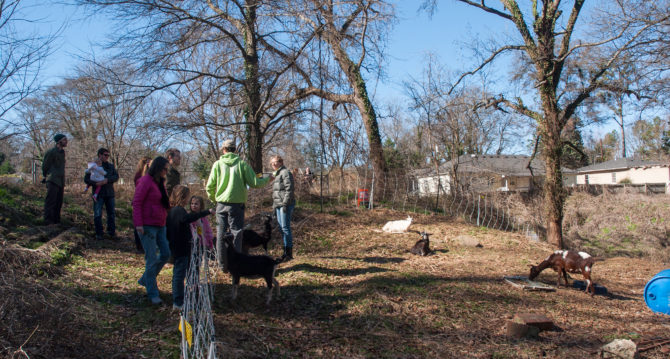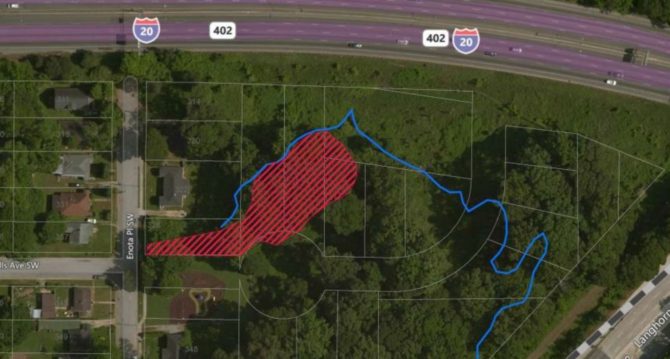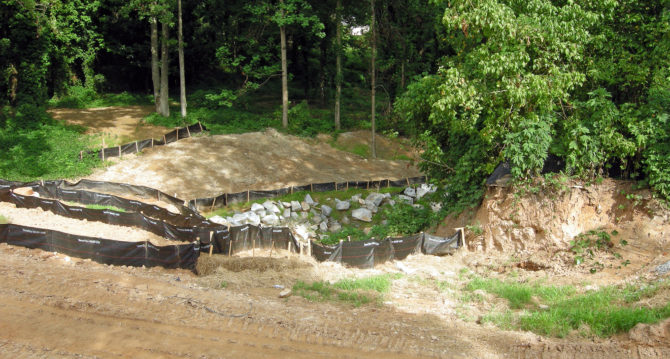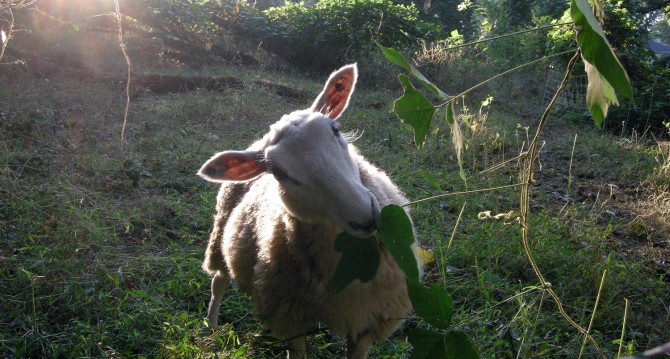As the goats were eating their way through underbrush and overgrowth in the future Enota Park expansion land, neighbors and visitors were invited to come meet the goats, including 2-week old kid’s.

January 28, 2017
As the goats were eating their way through underbrush and overgrowth in the future Enota Park expansion land, neighbors and visitors were invited to come meet the goats, including 2-week old kid’s.

January 19, 2017
The Atlanta BeltLine has made the following announcement regarding Enota Park:
Trees Atlanta has teamed up with Get Your Goat, a local company providing shepherd and goat grazing services, to help clear invasive ivy in the future Enota Park. Located between the current Enota Place Playlot and under-construction Westside Trail, the wooded area is currently covered with ivy and kudzu. The goats will be focused on a small area within the future park and are expected to consume that ivy within two weeks. Work is expected to take place over two weeks beginning on January 23, 2017.
Trees Atlanta will host a Greet the Goats event on January 28, 2017, from 10 a.m. until 1 p.m. but neighbors and guests are welcome to visit the goats at any time during park hours (6 a.m. – 11 p.m.). The grazing area will be located adjacent to the playlot to the north and northeast. The goats will be enclosed in an electric pet fence. Signs on the fence will provide safety precautions for spectators. Get Your Goat recommends that dog walkers keep their pets on a leash around the protective fence for safety.
Since September 2016, Trees Atlanta and many community partners have been working on a major restoration of Enota Park, a 12-acre greenspace in Southwest Atlanta. Mature hardwood trees, which cover much of the site, are considered a significant asset to the park because they represent a historic grove in a part of the city where tree canopy is spotty. These trees also provide a much-needed buffer to the adjacent I-20 highway borders the park on the north. Unfortunately, invasive species have overtaken much of the area, including high concentrations of privet, kudzu and English ivy. Trees Atlanta is removing six acres of invasive species, replanting native species to temporarily stabilize slopes and streambanks prior to the full buildout of the park which is being completed by Atlanta BeltLine, Inc.

July 27, 2016
More good news on the park, greenery, and Atlanta BeltLine front – the future expanded Enota Park site will soon see movement. Trees Atlanta applied for, and received, a $46,800 grant from the National Fish and Wildlife Foundation (NFWF). The 2-year project will tackle the removal of invasive species, such as ivy and kudzu, and include tree plantings along the I-20 slope to help control erosion and create a natural buffer from the highway.
NFWF press release:
Enota Park and Proctor Creek Restoration (GA)
Trees Atlanta, Inc.
Trees Atlanta and partners will remove six acres of invasive species and trash, replant native species to stabilize slopes and streambanks, and highlight the project through adult and youth
education programming. In addition, partners will redesign the portion of Proctor Creek that flows through the site and complete a full park design. Project will capitalize on the proximity
and timing of the Atlanta BeltLine Westside Trail (Enota Park Portion) project set for completion by the end of 2017. Partners include the Atlanta BeltLine, Park Pride, the City of Atlanta and
the Westview Community Organization.

October 9, 2014
2014 Kudzu Removal Program
Each year the Atlanta BeltLine, Inc. teams up with Trees Atlanta to complete invasive plant removals around the Atlanta BeltLine Corridor and in future Atlanta BeltLine park land. Invasive plant removal is vital to creating and maintaining healthy urban forests in the City of Atlanta.
This year, Trees Atlanta has hired a herd of sheep to eat acres of kudzu growing in Atlanta’s greenspaces, and the herd will be working in Enota Park in Westview.
In order to keep all of the surrounding neighbors informed, Trees Atlanta has provided several sheep FAQs:
Q: Do the sheep stay onsite all night?
A: Yes. The sheep stay onsite 24 hours a day and will eat weeds even at night.
Q: Why are the dogs in with the sheep?
A: The dogs are guardian dogs and are there to protect the sheep from stray dogs, coyotes, and other threats. The guardian dog is not particularly friendly toward pet dogs, so please keep leashed dogs away from the fence.
Q: How often does the shepherd check on the herd?
A: The shepherd checks on the herd at least once a day to make sure that none have escaped, that there is adequate water and food, and to feed the dogs.
Q: How long will it take the sheep?
A: The sheep should be onsite for no more than a week at Enota Park and three to four weeks at Boulevard Crossing Park.
Q: What are the sheep eating?
A: On this particular site they are eating Japanese hops and kudzu.
Q: How do you keep the sheep in one place?
A: The white fencing is a temporary, moveable electric fence. It keeps the sheep on task and out of harm’s way.
Q: How quickly do the sheep eat invasives?
A: The general rule of thumb is that 30 sheep can consume 1 acre of invasives in 2 weeks, depending on the weather and the type of vegetation being eaten.
For any questions or in case of emergency please contact either:
Brian Williams
Trees Atlanta
O: 404-681-4901
M: 912-856-1600
Jennifer Chandler
Shady Brook Sheep
M: 706-248-3745
Invasive Plants
The United States Department of Agriculture defines an invasive species as non-native (or alien) to the ecosystem under consideration and whose introduction causes or is likely to cause economic or environmental harm or harm to human health.
[Source: Atlanta BeltLine]
To see photos of the sheep at Enota Park view the photo gallery below or visit the Westview Facebook page.